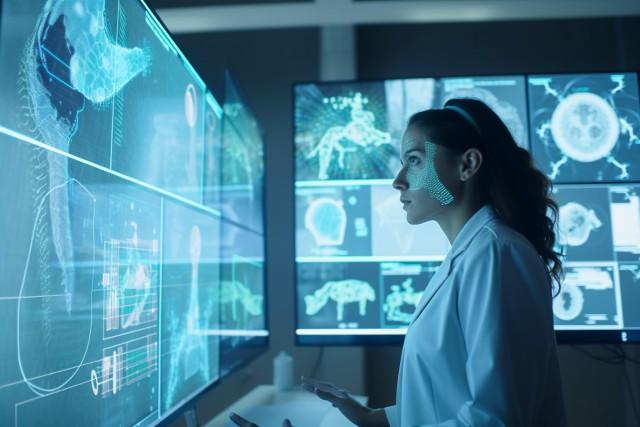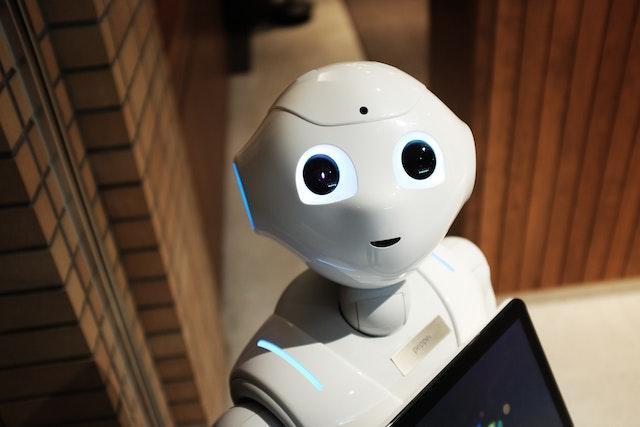Transforming the Future of Medicine: Powerful AI in Healthcare

Healthcare could undergo a revolutionary change thanks to artificial intelligence (AI). AI is revolutionizing the way healthcare professionals function, from increasing diagnosis accuracy to expediting patient care and medication discovery.
Table of Contents
ToggleWe will analyze the advantages and ethical ramifications of this transition as we examine the numerous ways artificial intelligence is changing healthcare. Including healthcare AI, artificial intelligence for healthcare, healthcare AI, and artificial intelligence in healthcare.
The Promise of AI in Healthcare: How Artificial Intelligence is Revolutionizing Medicine
Healthcare artificial intelligence has several opportunities to improve healthcare outcomes. Healthcare AI, for instance, can assist professionals in analyzing vast amounts of medical data to find patterns and trends that might not be visible to the naked eye. This may result in quicker, more precise diagnoses, and more individualized treatment strategies.
The examination of medical images, a crucial component of healthcare, is one area where AI is particularly promising. Artificial intelligence (AI) algorithms can spot potential anomalies that would not be obvious to the human eye. Enabling healthcare professionals to diagnose patients more quickly and effectively.
For instance, Stanford University researchers have created an AI algorithm that can identify skin cancer with a degree of precision comparable to board-certified dermatologists.
A vital component of healthcare administration, AI can also be utilized to optimize hospital operations and resource allocation. AI algorithms can assist hospital administrators in predicting and preventing bottlenecks. Enhancing patient flow, and maximizing staffing levels by analyzing data on patient volume and resource utilization.
Better patient experiences and better healthcare results may result from this.
From Diagnosis to Treatment: How AI is Changing Every Step of the Healthcare Journey
The entire healthcare process, from diagnosis to therapy, can be aided by artificial intelligence. In order to discover potential risk factors and tailor treatment strategies, AI can, for instance, examine patient data.
Artificial intelligence in healthcare can analyze patient data to find patterns and trends that might not be visible to the human eye. Enabling healthcare providers to create more individualized treatment regimens.
AI can assist pharmaceutical businesses in the drug discovery process by analyzing massive volumes of data to pinpoint prospective therapeutic targets and quicken the drug development cycle.
Companies can cut costs and time in the drug development process and accelerate the introduction of novel therapies to market by employing artificial intelligence in healthcare to identify prospective therapeutic targets.
Healthcare artificial intelligence is also showing promise in the creation of virtual assistants that can help medical professionals make treatment decisions. A virtual assistant like IBM’s Watson for Oncology, for instance, can assist physicians in identifying viable treatments based on a patient’s genetic makeup and medical background.
The Ethical Implications of AI in Healthcare: Balancing the Benefits and Risks
Although AI may have major advantages in healthcare, there are also ethical issues to take into account. For instance, if artificial intelligence healthcare algorithms are educated on biased data. Prejudice may result from their use in the healthcare industry.
Concerns about the security of patient information as well as the possibility of using AI in ways that are detrimental to patients are also present.
Together, healthcare practitioners and governments will need to create ethical standards for the application of AI in healthcare in order to address these concerns.
This will entail making sure patient privacy is respected and artificial intelligence algorithms used in healthcare are transparent and understandable.
Another ethical concern is the potential for AI to replace healthcare providers. While AI can be used to automate routine tasks, such as appointment scheduling and prescription refills, it is unlikely that artificial intelligence in healthcare will replace healthcare providers entirely.
Healthcare providers bring a level of empathy and human touch to patient care that cannot be replicated by AI.
The Future is Now: Real-World Examples of AI Making a Difference
Although healthcare AI is still in its infancy, there are already examples of AI changing the world. For instance, Google’s DeepMind Health is enhancing the accuracy of cancer diagnosis using AI algorithms.
Another such is the AI program that MIT researchers have created that can identify patients who are at danger of developing sepsis, a condition that can be fatal.
AI is also being utilized to create individualized patient treatment programs. One illustration of this is the use of AI to create individualized cancer treatment regimens. Artificial intelligence (AI) algorithms can find prospective treatment solutions that are suited to a patient’s particular needs by reviewing the medical background and genetic profile of the patient.
This may result in more effective cancer treatments and better cancer patient outcomes.
AI and the Human Touch: How the Integration of Technology and Medicine Can Improve Patient Care
Despite the potential advantages of artificial intelligence in healthcare, there are worries that the introduction of technology may cause the human element of care to disappear.
Several healthcare professionals, however, think that rather than replacing the human touch, AI may be utilized to improve it.
Healthcare AI algorithms, for instance, can assist healthcare professionals in identifying patients who need further care or are at danger of complications. Enabling them to intervene early and stop difficulties from arising.
Healthcare professionals may spend more time with patients by using Artificial intelligence for healthcare to automate regular chores like appointment scheduling and prescription refills.
Conclusion
The integration of AI in healthcare has the potential to transform the future of medicine. From improving diagnosis accuracy to streamlining patient care and drug discovery, the benefits of AI are significant.
However, to realize the full potential of healthcare AI, it will be important to address the ethical implications of AI. Ensure that patient privacy is protected. Ultimately, by working together to develop ethical guidelines and harness the power of artificial intelligence healthcare. Healthcare providers can improve patient outcomes and transform the future of medicine.
The future of healthcare is here, and AI is poised to play a major role in shaping it.













